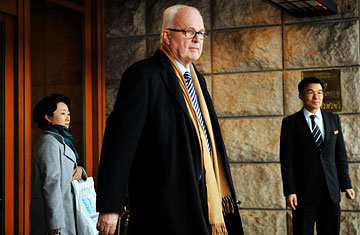
U.S. special envoy Stephen Bosworth leaves his hotel in Seoul to head for North Korea on Dec. 8, 2009
For more than a decade, ever since the first nuclear deal reached between the U.S. and North Korea fell apart, it has been an article of faith among Washington diplomats that with just the right configuration of carrots and sticks, Pyongyang could be enticed to stand down its nuclear weapons and begin to be drawn out of international isolation. That belief prompted the Bush Administration to jettison its first-term approach of diplomatic disdain and economic sanctions, and instead embrace, along with its partners in East Asia, a policy of engagement with the North — which culminated in another nuclear deal with Pyongyang that has since fallen apart.
On Dec. 8, the Obama Administration formally began its trudge up the same hill, as special envoy Stephen Bosworth, a veteran U.S. diplomat, traveled to Pyongyang for a day and a half of talks with North Korea. But to hear experts in Washington and East Asia tell it, whatever optimism the Obama team may have carried into office in January has already dissipated. Over the summer, the North's second test of a nuclear bomb, followed by the launch of long-range missile (on the very day Obama was in Prague making a soaring speech about a world free of nuclear weapons) has seen to that. Bosworth's trip to Pyongyang, says a diplomat in East Asia, has "very low expectations, and is really about one thing only: seeing whether the North will come back to the six-party talks" format that prevailed under the Bush Administration.
North Korea's dictator Kim Jong Il has previously declared the six-party talks "dead," saying only direct negotiation with the U.S. on a range of issues is acceptable. But pressure from China — thought to be the only country with any leverage over Pyongyang — may have produced a change of heart. Since late this summer, North Korea has taken some steps to ease ongoing tensions with South Korea; Kim personally met with former U.S. President Bill Clinton when he traveled to Pyongyang in order to free two American journalists who had managed to get themselves arrested in North Korea. If the warming trend continues, Bosworth may come out of Pyongyang on Thursday with an agreement by Pyongyang to return to multilateral negotiations, although they may be called something other than the six-party talks.
But that is the best the Administration is now hoping for, a variety of sources tell TIME. Early on, Obama had entertained the possibility of striking a grand bargain with North Korea: a nuclear deal, plus U.S. diplomatic recognition of the North and a move toward a formal peace treaty (South Korea and North Korea are still technically at war, since no treaty was signed to end the Korean War). Kim's provocative acts have blown those expectations away. "[The Administration] feels as if it held out its hand early on, only to have it bitten," says Bruce Klingner, a senior fellow at Washington's Heritage Foundation and a former CIA official. "Their attitude now is, you had your chance, and you blew it. The senior Asia people in the Administration have shifted to a much more skeptical lane in the road."
Even getting the North back to the bargaining table may prove difficult. Pyongyang wants to be recognized by the world as a nuclear power, and probably has other reasons to talk to Washington. Experts in Seoul say the North has sent signals recently that it is interested in negotiating a peace treaty with South Korea. That would be politically enticing to a segment of the South Korean population, but the Obama Administration now views it as a distraction. "The main agenda is the nuclear program, and Bosworth has made it clear he's not going to allow the North to sprinkle a bunch of diplomatic fairy dust around to divert attention," says a source in East Asia. "These guys are very focused now."
Focused — and wary. Though no one in the Administration will say so, discussion in Washington has shifted to "what if" scenarios, such as: What if the U.S. concludes that the North will not under any circumstances give up the nukes it has already produced (thought by intelligence agencies to range between six and 12 bombs)? At what point does the focus of policy become containment, as opposed to denuclearization? Klingner notes that the North is probably smart enough to "show enough leg" this week to get some form of nuclear diplomacy going again. But the fact that, privately, the Administration is already so skeptical — "those who still believe in direct engagement are now a fringe element," says Klingner — shows that the reality of dealing with North Korea didn't take long to assert itself. What a difference a year makes.
